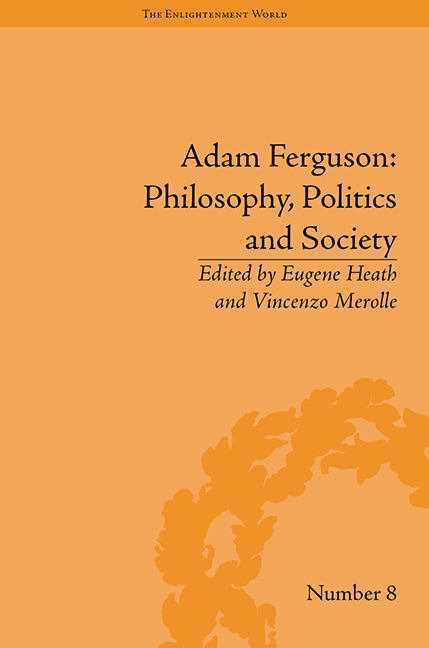7 - Adam Ferguson and Enlightened Provincial Ideology in Scotland
from III - Politics
Summary
There is a glint of truth in Walter Bagehot's claim that Adam Smith's Glasgow lectures on moral philosophy boiled down to a narrative of humanity's rise from savagery ‘to be a Scotchman’. Eighteenth-century Scots intellectuals perceived Scotland to be in the midst of an unprecedented and rapid transformation into a commercialized and sophisticated urban society. They inherited the legacy of a formerly independent nation now incorporated into a powerful commercial British Empire. At the same time they understood themselves, to perhaps a greater degree than before, as members of a print-driven, polite, Europe-wide Republic of Letters. Writing in a variety of venues on this transformation and its immediate and future setting, such men as Adam Smith, David Hume and Adam Ferguson simultaneously explained and diagnosed Scotland's new circumstances. In retrospect we might say that these Scots (and many other Europeans) confronted the development of the moral, social and economic characteristics of modern urban civilization. Bagehot shrewdly noticed that by investigating the origins and nature of civilization, enlightened Scots were also scrutinizing their own country's modern transformation. In a tone of modest celebration Alexander Wedderburn declared this self-consciousness in his preface to the first edition of the Edinburgh Review of 1755. Scotland's barbaric and socially narrow past was over; the nation had entered a new age of polite cultural sophistication. That kind of retrospective account of achievement could appear, as it did to Bagehot, smug, even complacent. Especially after the French Revolution, such a history of civilization might seem to defend a stable type of modernity. The French had tragically pursued a different type of modernity, what Benjamin Constant might have called ‘ancient liberty’ immoderately revived.
The polite Augustan tones of Scottish moral reflection might seem complacent. Yet they were anything but smug. Scholarship on enlightenment Scotland often refers to economic, political and religious tensions those Scots experienced in their corner of a developing modern world.
- Type
- Chapter
- Information
- Adam FergusonPhilosophy, Politics and Society, pp. 125 - 142Publisher: Pickering & ChattoFirst published in: 2014



